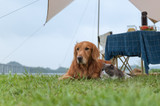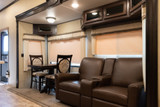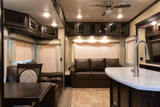Getting Folksy with Old-Time Traditions at the John C. Campbell Folk School
If you're traveling the country this summer, here is a great option for your RV vacation!
DIYing it is popular these days, whether it relates to renovating an old house, refurbishing old furniture, or growing vegetables, herbs and produce in backyard gardens. While it may seem that it is a relatively new phenomenon, the truth is that DIY is the foundation of how families lived and survived in some of the poorest regions of the nation, including rural Appalachia.
At the John C. Campbell folk School in Brasstown, North Carolina, those survival crafts such as blacksmithing, wood carving, chair caning and other old-time arts is still taught to enthusiastic students who sign up for a weekend or week-long course. But, alongside these old traditions are more modern ones, such as cooking and photography.
With the slogan, “Sing Behind the Plow,” the Campbell Folk School was started in 1925 and is one of the oldest folk schools still operating. Based on the Danish folk school concept of the 1800s, folk schools in the United States are non-competitive learning environments that offer opportunities to hone a craft with historic roots but adapted to fit into today’s modern aesthetics. Folk schools seek to bridge the gap between traditional classroom learning with the understanding that comes from also learning about one’s community, heritage and culture. Originally developed to instill pride in the farming way of life, folk schools were essential “life” schools, encouraging learning from childhood into adulthood and celebrating the heritage of the rural communities.
The John C. Campbell Folk School is considered one of the nation’s largest schools of this kind. It was founded in 1925 by Olive Dame Campbell and Marguerite Butler. Olive had spent time interviewing the people of Appalachia with her late husband John C. Campbell. Not knowing whether the people of this area of the North Carolina mountains would be interested in a folk school program, she announced a meeting after discussing the concept with a Brasstown shopkeeper, Fred O. Scroggs. When she returned to the area to meet with the community more than 200 people were on hand at the local church.
Local people supported the folk school from the beginning. They volunteered labor to clear the land and construct the buildings, supplied building materials and offered other support.
One of the first groups to be founded at the new folk school were the Brasstown Carvers. This group of wood carver craftspeople still meet today and are renowned for their abilities to fashion artistic creations from a block of wood. Wood carving is one of the classes still taught at the folk school.
According to its mission statement, it “… seeks to bring people to two kinds of development: inner growth as creative, thoughtful individuals, and social development as tolerant, caring members of a community.” This is accomplished by utilizing a pool of instructors – 800 strong – who are committed to the folk school’s vision and purpose. These instructors come from diverse backgrounds, such as studio artists and craftspeople to others with more traditional daytime jobs who satiate their creative sides as part-time blacksmiths, potters or in other art forms. According to information posted on the John C. Campbell website, instructors are expected to demonstrate the values of the folk school - joy, kindness, stewardship, and non-competitive learning.
Course offered at the Campbell Folk School include basketry, blacksmithing, book arts, calligraphy, dance, dyeing, felting, gardening and homesteading, kaleidoscopes, leather working, nature studies, photography, soap making and many more. Their course catalogue is 84 pages and features a general overview of class offerings and more detailed descriptions on a themed weekly schedule.
But a day at the folk school is not comprised of sitting in a studio and making art. Students’ days begin with morning songs, a morning walk on the mountain trails on the 300-acre campus, communal family-style meals served in the dining hall, excursions to artists’ studios, and evening with dancing, music, storytelling, game playing and literary readings.
Here’s a look at some of the other activities available at the John C. Campbell Folk School (when not affected by Covid-19):
- Contra and Square Dancing: This style of social dancing is considered partner-less. Each dancer is partnered up with another dancer to form a couple. In sets of two couples, dancers move up and down the line of dancers, dancing with each couple along the way. This is different than a square dance, which is comprised of four couples only. A contra dance line has no limitations.
- Music Concerts: Friday nights in the open barn features a variety of musicians playing a wide selection of musical genres – from old-time to Celtic. The sheltered, yet outdoor feel of the concerts usually draws a crowd, and seating is limited to hay bales or bring-your-own seating.
- Fall Festival: The 46th annual Fall Festival is in the planning stages for 2021. This annual event brings craters and artisans from throughout the US to the folk school for three-days of family fun and unique art shopping. Visitors can meander through the forested grounds, shopping for one-of-a-kind gifts in one of Appalachia’s most beautiful seasons. Children’s activities are offered, which can include pony rides and craft making booths.
- Little/Middle Folk School: Offered during the summer, these week-long programs are open to the local community as well as to guests from outside the area. Little folk schoolers are students in second to sixth grade and Middle folk schoolers include seventh through high school seniors. Students choose a variety of classes to take during the week, usually mini versions of some of the same craft classes offered to adults. In the past, students could select blacksmithing, nature arts, learning to play the dulcimer and basketry.
Those attending classes have housing options on campus. These include dormitory-style rooms with shared baths to rooms with private baths. All accommodations are climate controlled and include meals. Another option is the year-round campground, which has sites for tents to 34’ RVs.
The John C. Campbell Folk School is in Cherokee County, North Carolina, located in the far western corner of the state. It is about a two-hour drive from Asheville, North Carolina, Atlanta, Georgia, and Chattanooga, Tennessee. Nearby is Lake Chatuge a fresh water lake straddling the Georgia and North Carolina state line, the Eastern Band of Cherokee Indians lands, and the Nantahala National Forest.
Recent Posts
-
How to Keep Your Pets Safe While Camping
RVing and camping are a great getaway from the hustle and bustle of work and the city and the day-to …Jul 2nd 2024 -
Why Replace Your RV Furniture?
You may wonder when is the best time to replace your RV furniture. There is no one right answer to t …May 20th 2024 -
Can You Put Regular Furniture in an RV?
Many new and old RV owners ask themselves this question when they feel the need to update th …Apr 25th 2024 -
4 Tips for Securing RV Furniture While Traveling | RecPro
How To Secure RV Furniture There are few things that beat going out on an adventure with an RV …Apr 25th 2024 -
How To Keep RV Furniture From Peeling
Peeling RV Furniture | Why it Peels and How to Stop it Your RV furniture is a point of pride on yo …Apr 25th 2024 -
Turning up the Heat With an RV Fireplace
There’s an unlimited number of cool and exciting features you could add to your recreational vehicle …Apr 25th 2024







